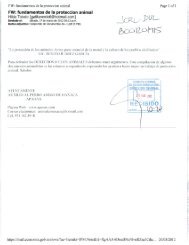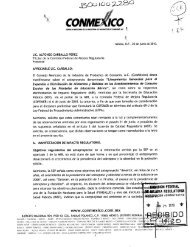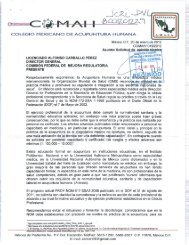Untitled
Untitled
Untitled
You also want an ePaper? Increase the reach of your titles
YUMPU automatically turns print PDFs into web optimized ePapers that Google loves.
REVIEW<br />
Carbohydrates and cancer: an overview of the<br />
epidemiological evidence<br />
TJ Key and EA Spencer<br />
Cancer Research UK Epidemiology Unit, University of Oxford, Oxford, UK<br />
Objective: To assess the epidemiological evidence on dietary carbohydrates and the risk of developing cancer.<br />
Method: Review of published studies, concentrating on recent systematic reviews, meta-analyses and large prospective studies.<br />
Conclusions: Carbohydrates have not been intensively investigated in epidemiological studies of diet and cancer. There is a<br />
moderately large amount of data on the possible association between dietary fibre and the risk for colorectal cancer; the results<br />
of studies have varied and no firm conclusion can be drawn, but the available data suggest that high intakes of dietary fibre<br />
possibly reduce the risk for colorectal cancer. There are also limited data which suggest that high intakes of sucrose might<br />
increase the risk for colorectal cancer and that high intakes of lactose might increase the risk for ovarian cancer. For other<br />
components of carbohydrates and other types of cancer, the available data are too sparse to draw even tentative conclusions.<br />
Further research is needed on the possible associations of carbohydrates with cancer risk.<br />
European Journal of Clinical Nutrition (2007) 61 (Suppl 1), S112–S121; doi:10.1038/sj.ejcn.1602941<br />
Keywords: carbohydrates; sugar; dietary fibre; cancer; review<br />
Introduction<br />
European Journal of Clinical Nutrition (2007) 61 (Suppl 1), S112–S121<br />
& 2007 Nature Publishing Group All rights reserved 0954-3007/07 $30.00<br />
www.nature.com/ejcn<br />
General<br />
The causes of cancer are incompletely understood, and<br />
cancers in different organs in the body can have different<br />
causes. Reviews have provided estimates that dietary factors<br />
may account for approximately 30% of cancers in industrialized<br />
countries and approximately 20% in developing<br />
countries, but it has proved difficult to clearly establish the<br />
effects of dietary factors on cancer risk (WHO, 2003a,b; Key<br />
et al., 2004). The WHO/FAO Expert Consultation in 2002<br />
categorized putative nutritional risk factors according to the<br />
strength of the evidence available (WHO, 2003a). The only<br />
diet-related factors for which there is convincing evidence of<br />
an effect on cancer risk are overweight and obesity, alcohol,<br />
aflatoxin and Chinese-style salted fish; there is also evidence<br />
that fruit and vegetables probably reduce the risk for some<br />
cancers, and that high intakes of preserved meat, saltpreserved<br />
foods and salt and very hot drinks and food<br />
probably increase the risk for some types of cancer (WHO,<br />
2003a).<br />
Correspondence: Professor TJ Key, Cancer Research UK Epidemiology Unit,<br />
University of Oxford, Richard Doll Building, Roosevelt Drive, Oxford OX3 7LF,<br />
UK.<br />
E-mail: Tim.Key@ceu.ox.ac.uk<br />
The body of evidence relating to diet and cancer risk in<br />
humans derives mostly from observational epidemiological<br />
studies conducted during the last 30 years, together with a<br />
few randomized controlled trials. Most attention has been<br />
given to a small number of prominent hypotheses in relation<br />
to certain food groups, in particular meat, fruit and<br />
vegetables; certain macronutrients, especially fat and saturated<br />
fat; and some of the micronutrients. With the<br />
exception of dietary fibre, relatively little attention has been<br />
given to the possibility that consumption of carbohydrates<br />
may affect cancer risk, although some attention has been<br />
given to sucrose and recently several studies have investigated<br />
the possible associations of glycaemic index and<br />
glycaemic load with cancer risk.<br />
Approach and methods of this overview<br />
Our aim in this overview is to summarize the current<br />
evidence and understanding of the possible role of carbohydrates<br />
in determining the risk for various cancers. This is not<br />
a systematic review of all relevant literature; rather, we have<br />
discussed previous assessments by expert panels (World<br />
Cancer Research Fund, 1997; Department of Health UK,<br />
1998; WHO, 2003a), meta-analyses and systematic reviews,<br />
and data from recent publications (1995 onwards), especially
















